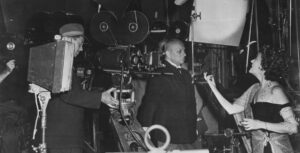Film directors have this drape of mystery all over them. Every single one projects different ideas on their sets and films, which inadvertently changes other’s perception of them as people.
In this Billy Wilder’s picture, we see two quite drastically different depictions of a film director profession. One movie director is still a successful creative locomotive (DeMille), whilst the other is a has been that never adjusted to the new realities of filmmaking (Mayerling), and sinked on the bottom along his main silent film star – Norma Desmond.
The fact that Mayerling is Desmond’s butler is a perfect parallel to Desmond’s own predicament. She refused to jump on the train of progress, and Mayerling would only indulge her in her stubbornness.
And yet, DeMille is not much better in that matter. He would rather lie to Desmond, than tell her the harsh truth about her ability to come back to filmmaking.
That whole charade depicts that complicated relationship between a director and a star. And mainly, the risk assessment aspect of certain choices. Would you rather create a protected, cushion-like environment, or be willing to be upfront and honest with your actors?
Nevertheless, I wouldn’t say that the film solely criticises film directors of that era. It actually portrays them as compassionate people, dedicated to their craft. DeMille would not sacrifice time and effort of his film crew on a project that is dead and buried from the very beginning. And Mayerling decides to pull off one last film directing gig, just to make his star feel desired again.
The mystery of directing hides in basic human flaws and strengths. And each and every director has to pick their own.
.

